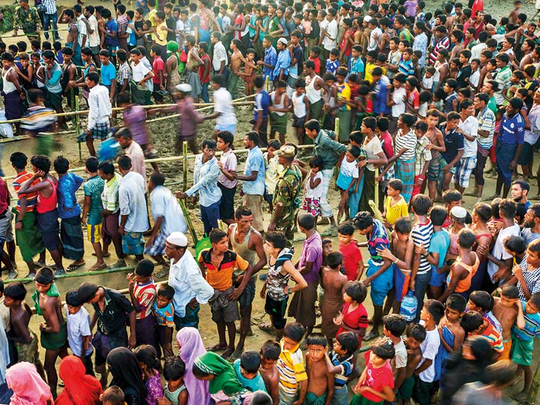
Dubai: The current momentum of the international community’s response to the Rohingya refugee crisis should continue until a political solution is reached, the head of an international aid organisation in Bangladesh has said.
The humanitarian crisis, which erupted due to political reasons, won’t end through aid, stressed Pavlo Kolov, Head of the Bangladesh office of Doctors Without Borders, known as MSF.
- Pavlo Kolov | MSF, Bangladesh
“There is a lot of concern coming up in the world. There is attention more than ever to aid in response to the crisis,” Kolov told Gulf News in an interview.
“From the MSF perspective, there is a need to sustain the attention. It is a massive humanitarian crisis. [International aid] agencies are responding to it, the government of Bangladesh is responding to it, and NGOs are responding to it,” Kolov said.
The Rohingya crisis, which has been dubbed the “world’s fastest-growing refugee crisis”, erupted late August when insurgents from Rohingya, which is a Muslim-minority group, attacked some 30 police posts in northern Rakhine with knives and homemade bombs.
Myanmar’s military, backed by Buddhist mobs, responded. While they said they are targeting insurgents, hundreds of thousands of refugees who fled their homes and escaped to Bangladesh said the response was a brutal campaign. It is estimated that nearly 600,000 people have fled the “ethnic cleansing” by Myanmar’s military and crossed the border to neighbouring areas. Different humanitarian organisations are racing against time to aid the displaced, including those inside Myanmar.
Kolov, who has been in Bangladesh for nearly 13 months, explained to Gulf News that the most shocking realities are the quantifying cases of violence the refugees were subjected to.
“It is powerful when someone shares a story of violence they endured, or their families suffered. To add to your shock when you quantify it… and see how widespread it is,” he said.
Commenting on the solution to the crisis, Kolov stressed “humanitarian aid are not going to solve the situation on either side of the border [of Myanmar].
The refugee crisis is a political crisis and demands a political solution.”
MSF on Thursday said it found that at least 6,700 Rohingya Muslims, including 730 children younger than five, were killed between August and September in a crackdown by Myanmar’s security forces. The findings were released after a survey conducted in the refugee camps in Bangladesh. Myanmar’s government put the figure at 400.
“The peak in deaths coincides with the launch of the latest ‘clearance operations’ by Myanmar security forces in the last week of August,” MSF Medical Director Sidney Wong was quoted as saying in a statement.
She said the findings were staggering, both in terms of the numbers of people who reported a family member dead as a result of violence, and the horrific ways in which they said they were killed or severely injured.
Though more than one million ethnic Rohingya Muslims have lived in the country for generations, they were stripped of their citizenship, denied almost all rights and labelled stateless.
Since Myanmar’s military conducted operations against the Rohingya in the northern Rakhine state, the civilian government has barred most journalists, international observers and humanitarian aid workers from independently travelling to the region.
MSF said the numbers of deaths are likely to be an underestimation “as we have not surveyed all refugee resettlements in Bangladesh because the surveys don’t account for the families who never made it out of Myanmar.”
— With additional input from AP.












